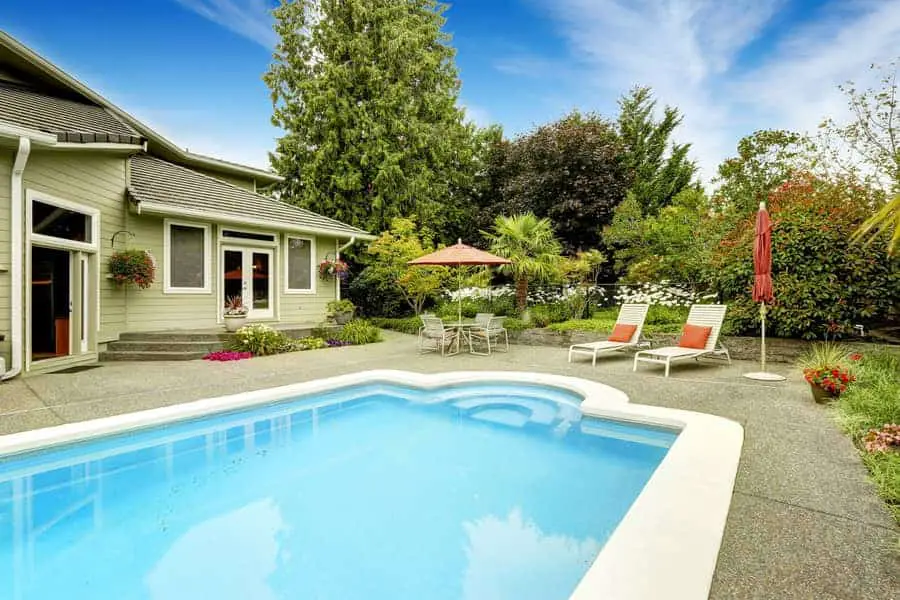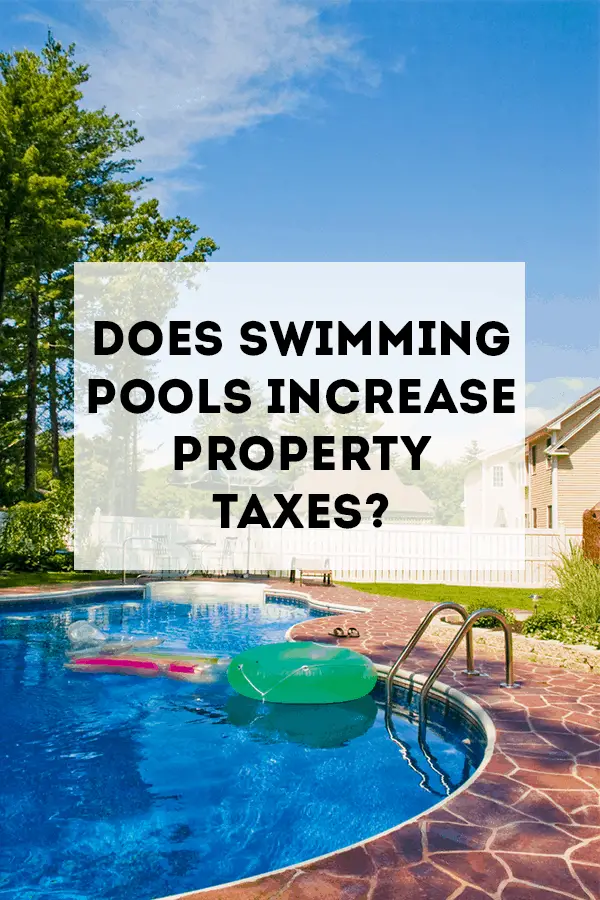
A swimming pool in your property yard adds beauty to the vicinity. And is a key source of refreshment after spending hours in the scorching sun. However, before installing one we need assurance that besides maintenance costs, we won’t cough more cash in terms of property taxes.
Do swimming pools increase property taxes? Yes, depending on the market, among other factors discussed above, your swimming pool may lead to a 5-30% increase in property value. The assessor then uses a uniform valuation to impose a property tax which translates to a tax increase with a similar margin.
Continue reading to learn about the other factors that can affect the property taxes increase.
In-Ground vs Above-Ground Swimming Pools
In-ground swimming pools are permanent structures hence add value to your property. This is because their installation requires excavation and removal of parts of the ground. To remove the pool, you will require demolition of the structure and some landscaping to level the ground out thus qualifying as a permanent structure.
Above-ground pools do not add property value since they are movable. Hence if you need to add value to your property an in-ground swimming pool may be the option for you. An increase in property value translates to increases in property taxes by an equal magnitude.
What Are The Weather Conditions of Your Place?
Before diving into installation of a swimming pool, you need to assess whether it’s the right step to take. For properties in warm states such as Hawaii, pools add greater value in property worth compared to those in colder states such as Michigan. This is because of the warm climate which makes it suitable for swimming.
The Condition of Your Pool
A swimming pool is as useful as you take care of it. You need more years of fun and refreshment? Keep it in good condition. Poorly maintained swimming pools degrade property value and do not affect property taxes, because they do not meet basic safety requirements.
How to Determine Property Value
We all need value for our money and not end up paying more in terms of taxes. Real estate professionals will determine the Value of your property depending on previous property sales in your neighborhood. Addition of a swimming pool may become a necessity to help you match other property valuations in your locality.
If you have a large space at your backyard that will support swimming pool construction and still have enough space for your needs, consider adding a swimming pool.
Property Use
You either run a real estate business or own property, and need your property as collateral for a mortgage or secure home equity. Adding a swimming pool will lead to a rise in your property value hence you can resell for a higher price or secure a high amount for your mortgage.
Property Value Assessment
A comp system determines the value of your property. You can consult with your real estate agent to know the value of your property. Recent sales too in your area will give a clear picture of what your house is worth.
Value of property in your locality. A swimming pool may be a worthy addition to making your property rise in value. If others have swimming pools, then it’s an option for you to consider.
Income approach. The property value is assessed based on income generated. This is the case with rentals, after deducting expenses such as insurance, operating and maintenance costs. High income translates to high property value.
Cost approach. This is similar to the market approach, however, takes a different view as it puts into consideration, the cost of replacing the entire structure at the current market pricing.
When To Add a Pool to Your Property ?
Imagine sitting by the poolside, enjoying the cool breeze as your feet soak in water. It’s a nice feeling, isn’t it? But worry has stricken you, it may not be a deal or maybe property taxes will rise and make you cough out more money.
Now, look at it this way. Pools aren’t cheap to build, pools lead to an increase in property taxes, but having one in your compound is the right financial decision to make. When?
In your neighborhood pools are there. This makes it hard for your property to sell, add one. You have adequate space and the climate of your locality is warm. Your property will increase by 5-8% in value by having a nice pool installed. This can offer a good return on investment upon selling.
Increase in area value. Someone might set up a golf course near your property, or property upgraded to meet a higher social status. To be on the same level as them, increasing your property value is inevitable. A swimming pool is a good way to increase your property value.
Swimming Pools Leading to Property Value Dive
Now we have seen scenarios when adding a swimming pool is a plus. Sometimes, a pool may make your property value nosedive. Yes, that would mean decrease in property taxes, but how about low return on investments or may be unable to resell?
A swimming pool costs $50,000 or more which is a huge sum to cough. While its maintenance costs $4,500 annually, this may skyrocket because of energy requirements if you are using a heated swimming pool. This shrinks your profits!
It also puts off aged couples and those with small children for fear of their safety that limits you to a vibrant and young couples as your market.
Tax Assessment
Property tax laws vary between states and municipalities within a state. Property is reassessed after improvements using real estate comps. A new structure that increases your property area or renovating your kitchen or bathroom, a swimming pool are some of the improvements which lead to an increase in property value.
Depending on the market, among other factors discussed above, your swimming pool may lead to a 5-30% increase in property value. The assessor then uses a uniform valuation to impose a property tax which translates to a tax increase with a similar margin.
Deferment and Tax Exemptions
During assessment and valuation, some parts of the property may be legible for tax exemptions either partly or wholly this varies from states. You pay deferred taxes and fees at a later date. Consult with your state which you qualify.
When To Remove Your Pool?
It may worry you if removing a pool will affect the value of your home. Yes, getting rid of your swimming pool is the right decision if this applies.
Your pool consumes more than a third of your backyard. Limited space is the last thing to worry about. Your kids need adequate playing ground without worrying about their safety. If your pool interferes with this, you probably don’t need it.
The pool is 25 to 30 years old and needs repair. Chances are that it will cost much because of its age, or won’t last long before another breakdown. Replacing it will offer a more permanent solution. A good swimming pool too needs to meet basic safety features.
If your area experiences short summers or is experiencing drought. Cold weather doesn’t favor swimming hence you need to reconsider your pool. We cannot have a swimming pool without water, therefore if your area is experiencing drought, getting rid of your pool will save you hefty amounts of money.
To sum it all, to get the best out of your swimming pool, you need to understand your locality, purpose (commercial or home-based), and tax regulation. Similarly, to get the best out of your swimming pool you need to do regular maintenance for long years of service.
Related Questions
Does having a pool increase property value?
Yes, an in-ground swimming pool increases property value and property taxes. Other requirements such as maintenance, water heating, and lighting are costly. It’s important to evaluate the return on investment before investing in the amenity.
Does having a pool increase homeowner’s insurance?
Unless excluded, the homeowner’s policy covers a pool. However, it’s important as a policyholder to consult with your policy provider. Ensure you observe basic safety measures during construction with the help of a professional.
How do swimming pool renovations affect my home?
To get the best out of your pool, keep the location in mind, type and size of a pool, practice good maintenance, and most important safety. It may lead to an increase or not affect your home value depending on the above factors.
What home improvements increase property taxes?
Assessments determine property value, on which property taxes are dependent. A higher value means a high tax. Besides a swimming pool, other improvements such as sheds and garage or a new building or improved fencing lead to an increase in property taxes.
Can you get your property taxes lowered?
Yes. You could pay more property tax compared to your property value. This is possible and the good news is, it can be fixed. Reassess your property value with the help a property appraiser. Compare this with properties of similar value in your area and how much they pay.
Then follow the formal litigation process. Remember to provide solid evidence based on comparable homes. There are lawyers specialized in this but you can do it on your own. Remember, it’s impossible to change tax rates.


